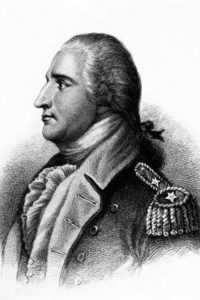Andebit et beaqui corendit, ut quostes esciendion re dit ad et prae parion es quia quas alibus sam, omnim faciden ducipidiat arum autem nobis enis es voat

Benedict Arnold’s Personal Troubles

Benedict Arnold’s time on Lake Champlain was filled with grief. He had continual run-ins with his fellow officers. First he disputed with Ethan Allen over command of Fort Ticonderoga when they stormed it in 1776. Then Arnold’s command was supplanted by a junior officer, leading him to resign his commission in the Massachusetts Militia. He joined the Continental Army during the Siege of Quebec, where he took command of the army following General Montgomery’s death, but he once again ran into trouble during the retreat.
During the withdrawal from Quebec, Arnold had instructions from the Continental Congress to purchase supplies from local merchants, issuing IOUs for the goods so the merchants could be repaid. The supplies were shipped to Fort Chambly, where Moses Hazen, commander of the 2nd Canadian Regiment was in command. Hazen refused to store the goods, believing them to be stolen. Arnold ordered the arrest and trial of Moses Hazen for disobeying orders, but the politically-connected Hazen had Arnold arrested instead. It was only with the help of Rebel General Horatio Gates, in command at Ticonderoga at the time, that the arrest warrant was dissolved. Historians continue to debate whether Arnold was actually engaged in anything illegal. In the aftermath of these incidents, Congressman Samuel Chase warned Arnold that “your best friends are not your countrymen.”
After the Battle of Valcour, Arnold was dispatched to Rhode Island. It was February 1777, when Arnold learned that he was passed over for yet another promotion in favor of several junior officers. Arnold was on his way to Philadelphia to offer his resignation when he learned that a British unit was on its way to raid a Rebel supply depot in Danbury, Connecticut.
He organized a militia response and was shot in the leg again during the action. When he got to Philadelphia, Arnold was given the rank of Major General. He was, however, still unhappy that he was not given seniority over those junior officers that were promoted ahead of him. He was in the middle of negotiations when word arrived in Philadelphia that Fort Ticonderoga had fallen to the British. Washington refused his resignation and ordered him north.







